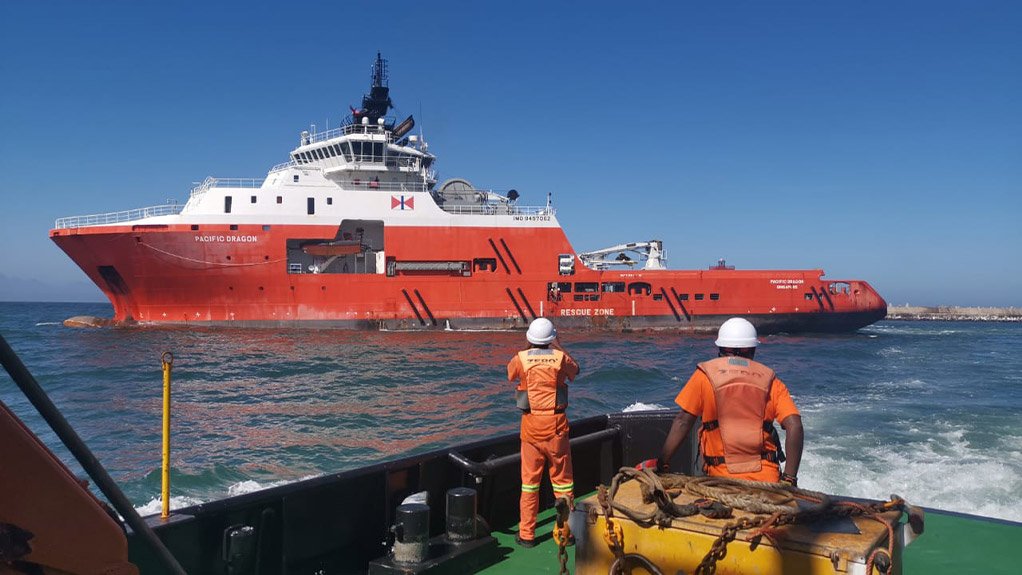/ MEDIA STATEMENT / The content on this page is not written by Polity.org.za, but is supplied by third parties. This content does not constitute news reporting by Polity.org.za.
Transnet National Ports Authority (TNPA) says the Port of Mossel Bay is well equipped to provide value following global energy giant Total’s significant gas condensate discovery on the Brulpadda prospects, located on Block 11B/12B in the Outeniqua Basin, 175 kilometres off the southern coast of South Africa.
Mossel Bay Port Manager Shadrack Tshikalange said the port’s role in the drilling expedition involved providing land and quay space for the logistics base operations, as well as marine services such as piloting, berthing, craft services and vessel and traffic control, to the vessels involved in the exercise.
“The oil rig Deepsea Stavanger operated off this coastline and a number of vessels for the emerging oil industry called at Mossel Bay. During this particular exploration exercise the various supply vessels made regular use of our berths. Our port is also able to provide a craft service to do crew changes and stores delivery offshore,” said Tshikalange.
Mossel Bay is the smallest of the commercial ports along the South African coast and lies halfway between Port Elizabeth and Cape Town. It is the only South African port that operates two off-shore mooring points within port limits. It is also home to one of only a few gas-to-liquids refineries around the world and South Africa’s smallest refinery, Mossgas, built by South Africa’s national oil company Petro SA in 1989, though the port deals mostly with the fishing industry. The Brulpadda find contains condensates – a kind of light crude oil – which only PetroSA’s Mossel Bay refinery can process.
Total’s drilling campaign commenced in November 2018 and is due to be completed between February and March 2019. It involves one rig and a fleet of four vessels being managed by AfriShore Shipping (PTY) LTD on behalf of Total.
Vessels
The Deepsea Stavanger rig worked about 180 km off shore of Mossel Bay. Supply vessels that worked alongside the Deepsea Stavanger are the Bourbon Diamond, Pacific Dragon, the Far Starling and the Normand Ranger.
The Bourbon Diamond is a Large Platform Supply Vessel for deep water operations and has a deadweight of 4,850 tonnes and break horse power (BHP) of 9,790. The vessel has been working on the Total project from the onset transporting supplies between the Deepsea Stavanger and the port.
The Pacific Dragon, belonging to Swire Pacific Offshore, joined the project halfway through the drilling programme and has only visited the Port of Mossel Bay once as she has a deeper draught and is tide dependant. She was mainly used to uplift bunkers in Cape Town and discharge to the Deepsea Stavanger. She has a bollard pull of 220-238 tonnes, BHP of 17,614 and deadweight of 4542.84 tonnes.
Solstadt Offshore ASA has two vessels involved, namely the Far Starling, with a deadweight of 4000mt and BHP of 9996, and the Normand Ranger, with a deadweight of 3954mt and BHP of 28000.
Future Prospects
In its media statement Total said: “Following the success of Brulpadda and confirmation of the play potential, Total and its partners plan to acquire 3D seismic this year, followed by up to four exploration wells on this license. The Block 11B/12B covers an area of 19,000 square kilometers, with water depths ranging from 200 to 1,800 meters, and is operated by Total with a 45% working interest, alongside Qatar Petroleum (25%), CNR international (20%) and Main Street, a South African consortium (10%).”
Writing for The Conversation, Robert Scholes, a Systems Ecologist at the Global Change Institute (GCI), University of the Witwatersrand and Rod Crompton, Adjunct Professor, African Energy Leadership Centre, Wits Business School, University of the Witwatersrand, said: “The government’s energy policy and its Gas Utilisation Master Plan agree that South Africa could usefully increase the amount of natural gas in the mix. It wants to diversify away from coal and imported crude oil.”
They added: “Since there’s a captive market nearby, Total – an international, for profit company that will charge a market-related price for its gas – will almost certainly first try to sell it locally, rather than incur the cost of transporting it elsewhere. The most likely first candidates will be the PetroSA gas-to-liquids plant and the Gourikwa (diesel) power station near Mossel Bay.”
In its own statement the South African government said: "Cabinet has lauded the offshore discovery of gas condensate by oil company Total that could contain one billion barrels of resources, which will significantly boost the country's oil and gas supplies."
It said the gas discovery ties into government’s efforts to develop the "ocean economy" through the second phase of its Operation Phakisa. Government’s Operation Phakisa: Oceans Economy programme is at work in Mossel Bay, where a slipway upgrade is in the pipeline and the port has entered into a Service Level Agreement with PetroSA to provide SETA accredited apprenticeship training to 15 youth from previously disadvantaged communities in Mossel Bay.
Issued by Transnet National Ports Authority
EMAIL THIS ARTICLE SAVE THIS ARTICLE ARTICLE ENQUIRY
To subscribe email subscriptions@creamermedia.co.za or click here
To advertise email advertising@creamermedia.co.za or click here











